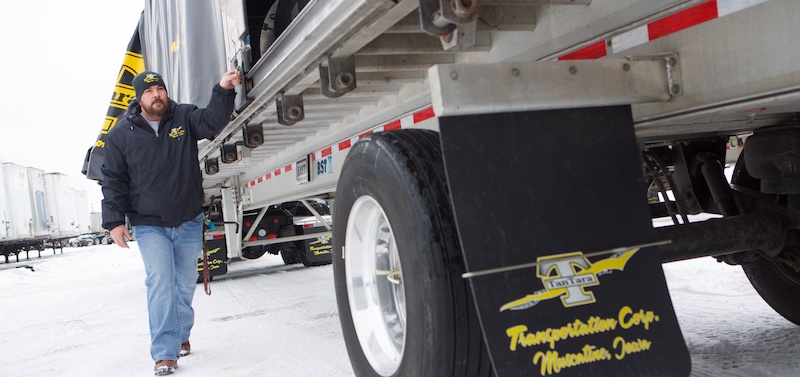The nature of your occupation may, at times, expose you to risks of injury that are often preventable. Nobody wants to be laid up in the hospital or at home, instead of doing your job and providing for yourself. You may roll your eyes at some of these obvious safety reminders, but if it sparks just one thought that keeps you from getting injured, it will have done its job. Please take a minute to read through these flatbed safety tips, who knows, you might learn something!
Roadside Safety –
Driving these days is becoming more and more distracted, which makes your vigilance all the more important. It’s not hard to imagine a noncommercial driver checking their phone when on the highway and unknowingly drift into your lane, or striking you when you’re adjusting a load. Remember these flatbed safety precautions when on the road.
- Avoid tarping or re-securing loads on the side of a roadway. Rest stops and parking lots are the ideal places to make sure your load is covered and secured correctly, due to the reduced risk of being struck by a distracted driver.
- Use your high-visibility outerwear! The more visible you make yourself, the less like you are to become a victim of distracted driving. Even if a distracted driver catches a glimpse of your gear out of there peripheral and steered clear of you, you have likely prevented a deadly accident.
Securing Loads –
Regardless of what you’re hauling it is likely precious cargo to somebody. Aside from the value of your load, it’s always a good idea to ensure it is properly secured, for your safety and those traveling around you. In short, maintain your gear and constantly visually inspect your load.
- Pre-trip inspections may seem tedious but are very necessary. Don’t just go through the motions when doing your pre-trip inspection, as you may overlook a worn tie down or bungee that could break – causing harm to you or others around you.
- Secure your load with a heavy tarp, tie down straps, and/or bungee cords. When using bungee cords be sure to hook them facing away from the tarp, avoiding any damage from a broken bungee cord.
- As mentioned above, always try and maintain and secure your load at a rest stop or fuel stop.
Slips, Trips, & Falls –
Performing any task repetitiously causes many people to “zone-out” over time, which is when you’re at the highest risk for an accident to occur. Take your time when you’re working around your truck or flatbed trailer, paying attention to the task at hand. Simply being mentally present will significantly reduce your risk of an accident.
- Invest in non-slip footwear. Many injuries occur when a driver or employee lose their footing and fall from a flatbed trailer. It may come as a surprise to you that you’re not as agile as you once were, so awareness of your footing should be a priority.
- Don’t skip a step! There’s nothing worse than a busted shin so prevent it from happening by hitting every step. This will reduce your risk of slipping off a step and keep your shins intact.
- Never jump from your flatbed trailer. Jumping off your trailer is an easy way to sprain an ankle, break a bone, or worse. Always try and dismount your trailer by using steps.
- Avoid stepping onto any narrow ledges. Creeping along the very edge of your flatbed will likely lead to you losing your footing and falling.
Loading & Unloading –
How to properly load and unload a flatbed trailer is probably something you think about on a daily basis. Aside from actually transporting your load this activity probably takes up the majority of your time and is something you do safely. Since you’re loading and unloading your flatbed on a daily basis, we’ll only point out a few flatbed safety tips you may not always pay attention to.
- Location, location, location! You always try and load your trailer on a flat surface, but do you pay much attention to side grade? It’s never a good idea to load or unload on a hill that slopes from the front to back of the trailer, and the same is true with a side to side grade. If it is not possible to load on a flat surface, make sure you’re accounting for any shifting that may occur and adjust from there.
- Be aware of your surroundings. This may seem very obvious on the surface, but what exactly is there to be aware of? You always make sure to stay clear of machinery loading your flatbed, but what about debris on the ground? Try and clear away any trip hazards and debris in case you need to quickly evacuate an area.
Safety is important to us here at TanTara. The intent here isn’t for you to make any groundbreaking revelations as it relates to flatbed safety, but bring these simple guidelines to the forefront.

